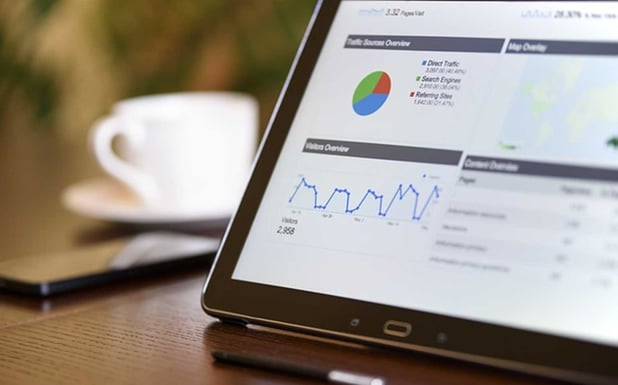Share this
Which is the Best CRM Software?
by Surefront on Aug 10, 2023 10:34:31 AM
Home > Blog > Which is the Best CRM Software?
Table of Contents
- How is Wholesale Customer Relationship Management Different?
- Best CRM Software Tools & Systems 2023 (Top 15 Comparison)
- Key CRM Features to Consider for Your Use Case
- Why Is Surefront the Best CRM Software for Retail Businesses?
In today's fast-paced, highly digital business landscape, customer relationship management (CRM) software is a vital tool. It's not just for enterprise businesses, either. CRM helps marketing teams and sales teams from companies of all sizes and industries.
Cultivating strong relationships is more important than ever, particularly for wholesale companies that depend on their relationships to secure both inventory and sales. Selecting the software with the right CRM capabilities will have positive impact on consumer sentiment and reduce internal errors –– helping a company's growth, efficiency, and bottom line.
However, there are a myriad of CRM options available, with each offering a unique set of features and capabilities. You don't want an annoying CRM that doesn't have the right functionalities for your team, or that doesn't integrate with your existing systems.
This can make choosing the best CRM software for your business an overwhelming ask. As the CRM space continues to evolve at a breakneck pace, staying informed about the latest CRM tools, capabilities, offerings, trends, and best practices is essential.
This article will guide you through the maze of CRM software options. We'll shorten the learning curve, so you can make an informed decision tailored to your organization's specific needs and objectives.
We will also delve into the key factors to consider when evaluating customer relationship management software solutions, highlight the critical features to seek out, and explore the benefits that best-in-class CRM software providers can bring to your business.
This article will take a comprehensive look at the leading CRM software solutions available today. We'll consider their strengths, weaknesses, and suitability for different business requirements. You may be a small business looking to streamline your sales processes, or a large enterprise aiming to enhance the performance of your sales teams and customer engagement across multiple channels.
Whatever the size of your company, our insights will provide valuable guidance on finding the CRM software that aligns perfectly with the strategic goals of your sales reps and marketing teams.

We will also discuss the importance of customization and scalability in CRM software, as your business evolves and expands over time. We'll examine how different CRM platforms address KPIs and accommodate the unique needs of various industries, such as retail, e-commerce, and wholesale.
We will even explore emerging CRM trends, such as artificial intelligence (AI), marketing automation, and data analytics, all of which are revolutionizing customer relationship management.
By the end of this article, you will have gained a deeper understanding of the best CRM software options available in the market, so you can make an educated decision. The right CRM software tools will empower your retail team to build lasting B2B relationships, discover sales opportunities and boost productivity to achieve long-term success.

So, buckle up and join us as we navigate the wild world of CRM software. We'll unveil the leading solutions and equip you with the necessary knowledge to select the best possible CRM software fit for your unique business.
Best CRM Software Tools & Systems 2023 (Top 15 Comparison)
1. Hubspot CRM
2. Keap CRM
3. Zoho CRM
4. Microsoft Dynamics 365 CRM
5. Pipedrive CRM
6. Salesforce CRM
7. Mailchimp CRM
8. Zendesk CRM
9. Insightly CRM
10. Sugar CRM
11. Apptivo CRM
12. Quickbase CRM
13. Monday Sales CRM
14. Freshsales CRM
15. Surefront CRM
-
Key CRM Features to Consider for Your Use Case
-
How to Match a CRM System to Your Needs
-
Choosing the Right Wholesale CRM and Sales Software
-
Integrating CRM with Your Existing Systems
-
Why Is Surefront the Best CRM Software for Retail Businesses?
How is Wholesale Customer Relationship Management Different?
Contrary to popular belief, wholesale CRM and that used for frontline retail are NOT the same thing.
Let's take a look at some key differences between the two:
1. Customer Relationship Dynamics:
In wholesale CRM, the focus is on managing relationships with businesses and organizations that purchase products or services in bulk for resale. The interactions are typically B2B (business-to-business) and involve building long-term partnerships, negotiating contracts, and providing support to wholesale buyers.
Frontline retail CRM, on the other hand, primarily deals with individual consumers in a B2C (business-to-consumer) context. Interactions are more transactional. They're focused on individual purchases, experiences that are personalized per user, and loyalty programs to enhance the sales lifecycle.
2. Sales and Ordering Process:
Wholesale CRM systems handle complex ordering processes specific to wholesale operations. They include features like: sales force automation, managing bulk orders, negotiating pricing and terms, coordinating shipments, and maintaining inventory levels.
Wholesale CRM emphasizes efficient order management and supply chain collaboration. Its primary purpose is to ensure smooth operations between suppliers, wholesalers, and retailers.
Frontline retail CRM, on the other hand, focuses on managing individual customer transactions, processing payments, tracking individual preferences, and delivering personalized experiences to B2C retail customers.
3. Customer Segmentation and Targeting:
Wholesale CRM involves segmenting customers based on their business size, industry, location, or other specific requirements. The CRM helps manage and track interactions with different B2B customer segments for targeted marketing and personalized service.
Frontline retail CRM is focused on individual consumer profiles. It analyzes factors like purchase history, preferences, and behavior for the purpose of delivering personalized recommendations, promotions, and customer experiences.
4. Relationship Management and Support:
Wholesale CRM places a big emphasis on relationship management and providing support to wholesale customers. This includes features such as collaborative workspaces, real-time messaging, and communication tools.
The goal of wholesale CRM is to facilitate effective collaboration across disparate teams and address customer needs on an individualized basis.
Frontline retail CRM, on the other hand, focuses on providing customer support to individual customers––per user, managing inquiries, handling returns or exchanges, and ensuring happy customers on a per-transaction basis.
5. Pricing and Negotiation:
Wholesale CRM often includes features to help manage pricing negotiations, discounts, and contract terms with wholesale customers. It helps businesses maintain consistent pricing structures, track negotiated deals, and handle volume-based pricing.
In frontline retail CRM, pricing is typically more standardized. Pricing is based on individual products or services, without the need for complex negotiation processes.
While both wholesale CRM and frontline retail CRM share some common functionalities –– such as customer data management and reporting –– their primary focuses differ significantly. Understanding these differences is crucial to your ability to select and implement the right CRM solution for your specific retail business.

Best CRM Software Tools & Systems 2023 (Top 15 Comparison)
It's a fast-paced and competitive business landscape out there. Effective communication and collaboration are vital to your company's success. Customer Relationship Management (CRM) tools play a crucial role in optimizing these processes.
You don't want to get saddled with an annoying CRM with a lengthy learning curve. You need a CRM tool that your team will actually use. You'll also want a platform that has the right user per month capacity to be used by your sales and marketing teams.
Seek out a powerful and comprehensive tool that, not only enhances communication, but also transforms the way your wholesale businesses collaborate. Many seek out free CRM software, but those tools are often not comprehensive enough for the complex needs of the retail industry. Look for a free trial, instead.
Whether you're a small business or enterprise operation, the right CRM software will drastically refine your business operations for enhanced success.
In this article, we will explore which CRM deserves the title of the "best CRM tool for wholesale businesses." We'll discuss the key features, benefits, and the value that fifteen top CRM tools bring to a wide range of organizations.
Let's get into it.
1. HubSpot CRM: Best CRM for Lead Generation
HubSpot CRM has lead generation capabilities. It provides businesses with tools to capture, nurture, and convert leads into full fledged customers. HubSpot CRM is a powerful CRM tool for lead generation and campaign management. The software offers a range of features to help businesses attract, engage, and convert leads.
HubSpot CRM doesn't just have tools for contact and lead management, email tracking, live chat, and lead nurturing. It also integrates seamlessly with other HubSpot tools, like the Marketing Hub and Sales Hub, so businesses can create a unified marketing and sales ecosystem.
The strength of HubSpot CRM lies in its intuitive interface, user-friendly design, and comprehensive lead and contact management capabilities. With its focus on lead generation and seamless integration with other HubSpot tools, HubSpot CRM is a great choice for businesses looking for a CRM solution to drive their marketing and sales efforts.
While it also offers robust features for lead management, Surefront provides comprehensive B2B business solutions for wholesale businesses. With Surefront CRM, data points from present and historical vendor communications are accessible in real time. Surefront's unified platform makes shuffling between emails, spreadsheets, attachments, and text messages to find the data you need a thing of the past.
2. Keap CRM: Best CRM Software for Small Businesses
Keap CRM, formerly known as Infusionsoft, is a powerful CRM solution for small businesses. Its comprehensive set of features span the verticals of marketing, sales, and customer service. Keap CRM stands out for its focus on automation and workflow management, which small businesses can use to streamline their processes and save time.
With Keap CRM, small business users can automate lead capture, follow-up communications, and customer nurturing. The software has robust email marketing capabilities, including customizable email templates, segmentation, and campaign tracking. Keap CRM even offers a built-in appointment scheduling feature, so small businesses can easily manage and automate client appointments.
With its user-friendly interface and automation-driven approach, Keap CRM is an excellent choice for small businesses looking to enhance their sales and marketing efforts, while streamlining operations.
Surefront CRM's integrated suite accelerates retail and supply chain businesses, a niche that Keap CRM doesn't directly target. While Keap focuses on small business and email marketing, Surefront offers a unified approach to CRM, PIM, and PLM that makes it better for retail businesses.
3. Zoho CRM: Powerful CRM with Customization Options
Zoho CRM is a feature-rich, highly customizable CRM platform that caters to businesses of all sizes. It offers a wide range of features to streamline marketing, sales, and customer support processes. Zoho CRM stands out for its extensive customization options.
With drag-and-drop customization tools, flexible workflows, and automation capabilities, businesses can adapt Zoho CRM software to match their unique sales processes and organizational requirements. Zoho CRM integrates seamlessly with other Zoho applications, such as Zoho Campaigns and Zoho Desk, providing a comprehensive suite of business tools for seamless data flow.
Zoho CRM even offers an AI-powered sales assistant called "Zia." Zia analyzes customer data, provides sales insights, and assists with lead and deal management. It also has voice and chatbot capabilities for seamless user interactions.
However, Surefront CRM boasts a more intuitive and user-friendly interface than Zoho CRM, for effortless navigation and quick adoption by team members. Surefront CRM provides features that Zoho CRM doesn't specialize in, like task management and product lifecycle management.

4. Microsoft Dynamics 365 CRM: Comprehensive CRM with Integration to Microsoft Suite
Microsoft Dynamics 365 CRM is a CRM solution with a comprehensive set of features that integrates with the Microsoft suite of products. It combines sales, marketing, customer service, and field service capabilities into a single platform, so businesses can manage their B2B relationships more efficiently.
Its seamless integration with popular Microsoft tools like Outlook, Excel, and SharePoint, gives Dynamics 365 CRM a familiar interface that enhances productivity. The CRM platform also leverages artificial intelligence (AI) to provide sales forecasting and personalized recommendations, and to automate routine tasks.
Microsoft Dynamics 365 CRM is suited for medium to large enterprises looking for a scalable CRM solution that integrates with their existing Microsoft infrastructure.
Microsoft Dynamics 365 Sales Insights, on the other hand, integrates AI to provide sales teams with predictive analytics, intelligent forecasting, and virtual sales assistant features. It helps with lead prioritization and opportunity scoring, suggesting the next best actions for sales and marketing teams.
With that said, Surefront CRM offers a specialized, comprehensive suite tailored towards retail and supply chain businesses. Microsoft Dynamics 365 lacks this specificity. Surefront has a solution for businesses with processes that are bogged down by hours of sifting through various communications to find product data or customer information.
Unlike Dynamics 365's more segmented approach, Surefront's contextual chat messaging feature lets teams search conversations to find data in 3 ways: by order, product, or quote. While Dynamics 365 is versatile, Surefront's retail industry contextual chat functionalities give it an edge for businesses that seek tightly integrated supply chain and collaboration management.
5. Pipedrive CRM: Simple and Intuitive Sales CRM
Pipedrive CRM is a user-friendly, intuitive CRM to optimize the sales pipeline. Pipedrive was designed to simplify the sales process for small and medium-sized businesses. Its clean visual interface makes it easy to track deals through the full sales cycle and pipeline, while its intuitive navigation reduces the learning curve for new-user adoption.
Pipedrive CRM helps the sales team visualize and manage the sales process, so no potential deals fall through the cracks. The software offers features such as contact management, deal management, email integration, activity tracking, and sales reporting.
Pipedrive CRM also provides mobile apps, allowing users to manage their full sales pipeline with their Android and IOS devices. With its simplicity and focus on sales pipeline management, Pipedrive CRM is an excellent choice for businesses seeking a straightforward CRM solution.
Pipedrive also has an AI-powered sales assistant named "Sales Assistant" that analyzes data and provides actionable, per user consumer insights to sales professionals. It helps with lead scoring, deal prioritization, and suggests optimal sales activities.
While Surefront also offers a full suite of sales tools, it excels in collaboration, facilitating seamless communication among internal and external team members –– making it the best CRM platform for the communication-heavy wholesale industry. Surefront was built to address the massive amounts of data and images that wholesale distribution companies work with for each product, which sets it apart from more general CRM solutions.
6. Salesforce CRM: Best CRM Software for Sales Teams
Salesforce customer relationship management software is well-known for its robust sales management capabilities. It has extensive features for managing and tracking leads, and optimizing sales functions. Salesforce CRM is one of the most popular and widely used CRMs available. Its extensive functionality and versatility makes it suitable for businesses of all sizes and industries, from a small business to an enterprise company.
Salesforce CRM has a wide range of features for sales, marketing, customer service, and analytics. Its comprehensive sales force automation tools include lead and opportunity management, sales forecasting, marketing automation and collaboration features. Salesforce CRM also provides advanced customization options, allowing businesses to tailor the CRM software to their specific needs, per user.
The software's AppExchange marketplace offers a vast selection of third-party integrations. This allows for seamless integration with other business systems, as well as Android and IOS devices. Salesforce CRM's reputation for scalability, customizability, and extensive features makes it a top choice for any sales team seeking a robust, flexible CRM solution.
Salesforce has an AI-powered assistant, "Salesforce Einstein," embedded within the Salesforce CRM platform. It leverages advanced machine learning algorithms to analyze customer data, provide personalized insights, and automate repetitive sales tasks.
Surefront CRM Software, on the other hand, helps meet the unique needs of wholesale businesses. While Salesforce excels with diverse functionalities and scalability, Surefront is specifically tailored to the dynamic requirements of wholesale operations –– with a unified suite of features like real-time messaging, file sharing, and collaborative workspaces.
7. Mailchimp CRM: Best CRM Tool for Marketing Campaigns
Mailchimp CRM is an excellent choice for marketing automation and marketing campaigns. It offers marketing and sales teams advanced features for managing campaigns, email marketing, and customer segmentation.
Mailchimp CRM software helps businesses with features like contact segmentation, audience management, and behavioral tracking. It lets users create targeted campaigns, track customer engagement, and analyze campaign performance. Mailchimp CRM also provides tools for automating email marketing workflows, such as welcome emails, abandoned cart reminders, and post-purchase follow-ups.
With its focus on marketing automation, campaign management and email segmentation, Mailchimp CRM is an excellent choice for businesses that rely heavily on email marketing. It's also a great choice for teams that need it for efficiently managing customer relationships, per user, within their campaigns.
While Surefront integrates with popular marketing tools, its primary focus is on wholesale-specific, back-of-house functionalities such as: wholesale order management, collaboration with suppliers and retailers, and improving overall supply chain efficiency.
Surefront's unique features include the ability to check product order status, message sellers, ping employees, and request modifications to contracts right in Surefront wholesale CRM. These retail-specific features exceed Mailchimp's email marketing-centric CRM.

8. Zendesk CRM: Best CRM Software for Complete Customer Life Cycle
Zendesk CRM provides end-to-end customer lifecycle management. It offers customer support and per user ticketing features for seamless interactions. Zendesk CRM has a wide range of features for customer support, sales, and engagement. It allows businesses to track interactions per user across multiple channels, including email, chat, social media, and phone.
The software provides a unified view of customer data, so businesses can deliver personalized and timely support to each unique customer. Zendesk CRM includes ticketing systems, knowledge bases, and self-service portals to streamline customer support operations.
Additionally, it offers advanced analytics and reporting features. This helps companies gain insights into support and sales team performance, per user, as well as sales pipeline management. Its focus on customer-centricity and end-to-end customer management makes Zendesk CRM is a great choice for businesses looking to provide exceptional customer experiences and streamline their support processes.
While Surefront includes comprehensive customer relationship management and engagement capabilities, its key differentiator lies in its wholesale-specific tools. This includes a robust visual product catalog that let's users collaborate right on the product images, as well as order tracking, project management, and retailer/supplier collaboration features.
9. Insightly CRM: Top CRM software for Analytics and Reports
Insightly CRM is known for its analytics and reporting capabilities, which provide businesses with valuable insights into their sales performance. It offers powerful tools to track and analyze sales, marketing, and data. Insightly CRM then enables businesses to create custom reports, visualize data with charts and dashboards, and gain actionable insights.
The software provides in-depth analytics on key performance indicators, sales pipeline metrics, customer behavior, and marketing campaign effectiveness. Insightly CRM also includes project management features, which businesses can use to track projects, assign tasks, and collaborate with team members.
It offers integration capabilities with popular third-party applications, while providing mobile apps for on-the-go access on Android and IOS devices. Insightly CRM's focus on analytics and reports makes it a valuable tool for businesses that want to leverage data-driven insights to drive sales and marketing strategies, and to improve overall performance.
Surefront also offers basic reporting features, however, the primary focus is on facilitating collaboration, combining internal and external teams onto one unified CRM. Users can mine historical sales data to inform their purchasing decisions, then export any data in seconds to internal or external stakeholders.
This lets sales teams confirm product orders in a fraction of the time, and traditional CRM analytics platforms can't touch it.
10. SugarCRM: Best CRM Software for Midsize Businesses
SugarCRM is flexible and scalable CRM software designed for midsize to large businesses. It offers a comprehensive suite of sales, marketing, and customer service tools to help organizations effectively manage their customer relationships. SugarCRM's extensive customization options are a notable feature, letting businesses tailor the CRM to their unique requirements.
Users can create custom modules, fields, and workflows to match their specific business. SugarCRM provides advanced reporting and analytics capabilities, helping users gain valuable insights into sales performance, customer trends, and marketing campaigns.
The software also offers robust integrations with other business applications, facilitating data synchronization and providing a unified view of customer information. With its flexibility, customization options, and advanced analytics, SugarCRM is a solid choice for businesses seeking a scalable CRM solution that can adapt to their evolving needs.
Surefront CRM's integrated platform caters specifically to retail and supply chain businesses, a niche not directly targeted by Sugar CRM. While Sugar CRM provides a customizable CRM solution, Surefront enables real-time collaboration between all stakeholders involved in bringing products to market.
The retail industry is highly visual, which is why Surefront's industry-oriented CRM offers cloud based, centralized images. Users can make notes and tag stakeholders right on the product images. Teams can make email marketing campaigns intuitive with easily accessible product imagery. Surefront CRM's turn reluctant new contacts into highly motivated sellers or buyers.
11. Apptivo CRM: Best CRM Software for Workflow Automation
Apptivo CRM has workflow automation capabilities that let businesses streamline processes. They can also automate marketing campaigns and other repetitive tasks. With Apptivo CRM, users can create custom workflows, automate lead assignment, track progress, and set up automated notifications and reminders.
The software provides a visual interface for designing workflows, making it easy for businesses to define and implement their unique processes. Sales and marketing automation lets businesses reduce manual effort, improve efficiency, and ensure consistent and timely task execution.
Apptivo CRM's focus on workflow automation makes it an excellent choice for businesses looking to optimize their operations and improve productivity.
Surefront CRM stands brings together all key project stakeholders to ensure streamlined communication. Unlike Apptivo, Surefront’s comprehensive suite also facilitates easier, more accurate compliance audits and reporting.
Users can review event logs and audit trails for SOX compliance, right in Surefront. They can view all present and historical data in one place, for easier reporting, fewer errors, and happier teams. And, for bonus points, prospective clients can try Surefront's free plan for 30 days before they commit.
12. Quickbase CRM: Best CRM Software for Integrations
Quickbase CRM is known for its integrations. It lets businesses connect with a wide range of third-party applications and systems. Quickbase is no annoying CRM. It offers pre-built, intuitive integrations with popular tools such as Salesforce, Mailchimp, and QuickBooks.
It also provides custom integration options for seamless data flow between different systems, including enterprise resource planning systems. So all information is synchronized and up to date. By integrating with other business applications, Quickbase CRM helps businesses leverage their existing data and processes, eliminate manual data entry, and gain a holistic view of customer information.
Quickbase CRM's robust integration capabilities make it a top choice for businesses seeking a CRM solution that seamlessly integrates with their existing technology stack.
Surefront CRM, has unique features like task management and quote management built into the solution, which outperforms QuickBase's more general CRM. Surefront provides real-time RFQ and quote confirmation features. Retail teams can send requests for quotes (RFQs), manage quotes, and respond to RFQs right from the app.
Retail teams regularly use Surefront to reduce the time it takes to confirm quotes by a whopping 40% or more. Try as they might, non-unified CRM solutions can't replicate this kind of productivity.
13. Monday Sales CRM: Good CRM Tool for Client Communication
Monday Sales CRM is a dynamic, adaptable platform that revolutionizes the management of sales processes, making it a great tool for businesses of all sizes. Unlike many traditional CRMs, it offers highly customizable workflows. This lets teams design their sales functions based on unique needs, to enhance efficiency and productivity.
With Monday Sales CRM, every communication with a client is tracked, recorded, and easily accessible. This provides invaluable insight into the customer journey, facilitating timely and appropriate responses, and ultimately improving both satisfaction and customer retention. The automated reminders and follow-ups ensure that no potential lead or essential task slips through the cracks, boosting conversion rates.
One standout feature is the software's capacity for seamless integrations. It can be easily connected with an array of tools like email, calendars, and various marketing automation platforms to create a centralized sales ecosystem. This unified approach eliminates data silos, increases transparency, and encourages collaborative efforts across the team.
The visual dashboards and real-time reporting features of Monday Sales CRM offer a clear picture of sales metrics at a glance, aiding in data-driven decision-making. These analytics help identify bottlenecks, track performance, and forecast sales trends, for more strategic planning and improved results.
Surefront is designed specifically for retail and supply chain businesses, a niche not directly addressed by Monday CRM. Surefront's robust, integrated platform has unique features, like a lead management tool and automated data entry. These retail-specific features work to free up sales teams to focus on customers.

14. Freshsales: Top CRM Software with AI Lead Scoring
Freshsales stands out with its AI lead scoring capabilities, leveraging artificial intelligence to prioritize and qualify leads per user. Freshsales uses artificial intelligence to analyze customer data and prioritize leads, based on their likelihood to convert.
The AI lead scoring feature helps sales and marketing teams focus their efforts on the most promising leads to improve conversion rates. In addition to lead scoring, Freshsales CRM offers a wide range of sales and contact management features, as well as email tracking, deal and project management software, and reporting and analytics.
The software provides a user-friendly interface and customizable workflows, making it easy for businesses to track and manage their sales infrastructure. With its emphasis on AI lead scoring and sales management, Freshsales CRM is an excellent choice for businesses seeking a CRM solution that leverages artificial intelligence to drive sales success.
While Surefront doesn't emphasize AI lead scoring, it provides comprehensive features for collaboration and communication within the wholesale industry. Surefront includes unique features that liberate product data that's hidden in a fortress of firewalls and red tape. With Surefront, the right stakeholders –– and only the right, selected stakeholders –– can access product data in seconds.
15. Surefront CRM: Best Wholesale CRM Software
Surefront CRM platform is specifically designed to cater to the unique needs of wholesale businesses. It offers a comprehensive suite of features, including collaborative workspaces, real-time messaging, file sharing, customizable dashboards, and customer engagement tools.
Surefront stands out as the best CRM tool for retail and wholesale teams. It facilitates real-time, seamless communication between internal AND external stakeholders –– making it a must for communication-heavy wholesale businesses.
Surefront's product syndication features let sales teams customize product listings for 100s of ecommerce marketplaces in a single click. Conversations can be segmented by order, quote, or product, so marketing and sales teams always have the right data they need to move the order confirmation process forward.
But that's not all. Surefront's digital product catalogs let stakeholders add questions and tag other users right from the platform. internal and external teams work from a catalog full of robust product visuals. Production teams benefit from 3D product imagery, so they have a 360-degree view of products as they bring them to form. No more Excel documents. No more email threads. No more jumbled communications.
Surefront is at the forefront of CRM innovation as the retail business landscape continues to evolve. While other customer relationship management software tools excel in specific arenas, empowers retail organizations to achieve their goals with a fraction of the effort... and headcount.
Key CRM Features to Consider for Your Use Case
The wholesale industry can be more nebulous than most, and most of it is based on B2B communications. CRM tools for wholesale streamline those customer interactions, manage sales funnels, and improve customer service. Wholesale tools are built to centralize customer data, providing wholesalers with valuable insights into customer behavior, preferences, and purchase history.
CRM systems can also foster collaboration among disparate wholesale sales teams, for a more unified approach to customer management. As wholesalers often deal with a large client volumes, CRM tools play a critical role in maintaining customer relationships and driving sales growth.
Let's take a look at some of the key features of CRM for wholesale businesses:
1. Streamlined Wholesale Order Management:
To find the best CRM for wholesale businesses, you must first look for robust order management capabilities. An ideal CRM will provide a centralized platform to efficiently manage and track wholesale orders.
This includes features like automated order processing, inventory management, and real-time order status updates. But to help communication take place more efficiently, you'll also want to look for seamless collaboration with suppliers, customer service agents, wholesalers, and retailers.
With a CRM that excels in wholesale order management, you can ensure smooth and streamlined operations, reduced errors, and improved customer relationships.
2. Collaboration and Communication Tools:
Effective collaboration and communication are crucial for successful wholesale operations. Look for a CRM that offers collaborative workspaces with internal and external stakeholders, real-time messaging, and file sharing functionalities.
These features enable seamless communication among team members, suppliers, and retailers. They also facilitate quick decision-making, while helping to resolve issues promptly and foster stronger relationships.
A CRM with robust collaboration and communication tools ensures that everyone involved in the wholesale sales process is on the same page. The result is improved efficiency, productivity, and happier customers.
3. Customizable Dashboards and Reporting:
To make informed business decisions, you need access to real-time data and reports. The best CRM for your use case will offer customizable dashboards and reporting capabilities for your unique wholesale business needs. This allows you to track key performance indicators (KPIs), monitor sales pipelines, analyze consumer data, and gain valuable insights into your wholesale operations.
With personalized dashboards and comprehensive reports, you can identify trends, spot opportunities for growth, and optimize your strategies to drive better results.
4. Integration with Wholesale-Specific Tools:
As a wholesale business, you likely utilize various specialized tools and systems to manage different aspects of your B2B operations. Look for a CRM that seamlessly integrates with these wholesale-specific tools. Whether it's inventory management software, accounting systems, or supplier portals, you'll want a CRM that can integrate with your existing tech stack.
Integration capabilities will enhance efficiency, reduce duplication of work, and empower you to make informed decisions based on comprehensive data across your entire ecosystem.
By considering these key features in a wholesale CRM, you can optimize your processes, enhance collaboration, and improve communication and sales forecasting. All these powers combine to give you a leg-up on the competition and drive lasting success for your wholesale operations.

How to Match a CRM System to Your Needs
Choosing the right CRM system for your needs is essential for the success of your company, whether you're a small business or an enterprise level company. You don't want an annoying CRM that can't keep up with your business processes.
So, here are some steps to help you match a CRM system to your specific requirements:
1. Identify Your Goals and Objectives:
Start by clearly defining your goals and objectives. Determine what you want to achieve with your CRM system investment.
Whether it's improving sales efficiency, enhancing customer service, streamlining marketing campaigns, or managing supplier relationships, understanding your specific goals will help you choose the right CRM functionalities.
2. Assess Your Business Processes:
Analyze your existing processes to identify areas that could benefit from CRM automation and optimization. Consider the specific activities involved in your sales, marketing, and customer service operations.
Identify pain points, bottlenecks, and areas that could be improved through better collaboration or data management. This will help you understand the specific features and capabilities you need from a CRM system to address those challenges.
3. Consider Scalability and Integration:
Evaluate the scalability and integration capabilities of any CRM systems you are considering. Consider your future growth plans to ensure that the CRM system can scale to accommodate your expanding needs.
On top of this, you'll want to assess how well the CRM system can integrate with your existing software tools, such as those that manage email clients, as well as project management systems or accounting software. Seamless integration will ensure data consistency and streamline your workflows as your business grows.
4. Prioritize Key Features:
Make a list of the essential features and functionalities that you require from a CRM system. This list should be based on your goals, business processes, team priorities, and any specific requirements unique to your industry or niche.
Some common CRM features to consider include: contact management, lead management, project management, reporting and analytics, automation, customer support capabilities, and mobile access. Prioritize these features based on their importance to your business.

5. Research and Compare CRM Systems:
Research all of the different CRM systems available in the market, then compare them based on your requirements and priorities. Look for CRM systems that align closely with your goals and offer the features you need to achieve business success.
Read customer reviews, check case studies, and consider reaching out to CRM vendors for demos or trials. If it's going to be an annoying CRM vendor, you'll realize it pretty quickly during your first conversation.
Pay attention to factors such as user-friendliness, customer support, pricing models, and how ongoing maintenance and updates are rolled out.
6. Test and Evaluate:
Before committing to a CRM system, you'll want to test it out. Take advantage of any free trial or demos to explore the CRM's interface, usability, and performance.
Involve key stakeholders from your sales, marketing, and customer service teams in the evaluation process to gather their feedback and ensure the system meets their needs, as well.
7. Seek Expert Advice if Needed:
If you're unsure about which CRM system is the best fit for your needs, consider seeking advice from CRM consultants or industry experts. They can provide valuable insights based on their experience and knowledge of CRM systems in your specific industry.
By following these steps, you can match a CRM system to your business needs. Be sure that it aligns with your goals, optimizes your sales process, and enables your team to achieve greater efficiency. Some CRM software, such as Surefront CRM, offers a free trial so you can take it for a test drive before you invest.

Choosing the Right Wholesale CRM and Sales Software
The right software for you will be defined by the priorities of your unique business structure. With that said, when it comes to choosing the right CRM and sales force automation software for the retail industry, Surefront is the clear winner.
This is because of its comprehensive features for wholesale businesses and small business sales teams. Even the best tool can be an annoying CRM when it's not designed for the industry in which its being used. Surefront was built for, and by, the retail industry.
Here are some key reasons why Surefront CRM is the top choice for wholesale and retail teams:
1. Tailored for Wholesale Businesses:
Surefront is designed specifically for the unique requirements of wholesale operations. It offers features that cater to wholesale order management, collaboration with suppliers and retailers ––both inside and outside of your business –– and improves overall supply chain efficiency.
By choosing Surefront, you ensure that your CRM and sales software aligns perfectly with the needs of your wholesale business. Surefront even offers a free trial, so you can begin enhancing profit margins without spending a single cent.
2. Seamless Communication and Collaboration:
Surefront provides a centralized platform for seamless communication and collaboration. Its intuitive interface facilitates real-time messaging, file and image sharing, and video conferencing. It's internal/external communication capabilities and quote customization features enable efficient collaboration among suppliers, wholesalers, and retailers.
This promotes better communication. Quotes are confirmed faster. Sales opportunities are acted upon instantaneously. And the whole company, whether its a small business or enterprise, benefits from enhanced ROI.
3. Streamlined Wholesale Order Management:
Surefront excels in wholesale order management with features such as automated order processing, inventory management, and real-time order status updates. These capabilities streamline the entire order management process, reducing errors, improving accuracy, and enhancing customer satisfaction.
With Surefront, you can efficiently manage your wholesale orders, track inventory, and ensure timely delivery.
4. Customizable Dashboards and Reporting:
Surefront provides customizable dashboards and reporting capabilities that allow you to track and analyze crucial data points. You can gain real-time insights into interactions, sales pipelines, and performance metrics.
With this information, you can make data-driven decisions, identify trends, measure customer feedback, and uncover growth opportunities. When it comes to CRM and sales software for wholesale businesses, Surefront stands out as the only choice with 10x ROI, guaranteed.

Integrating CRM With Your Existing Systems
Integrating your CRM with your existing systems is crucial to ensure seamless data flow, eliminate manual data entry, and create a unified view of your business operations.
Here are some key steps to consider when integrating your CRM with existing systems:
Identify Integration Needs:
Start by identifying the specific systems and applications that you want to integrate with your CRM. This may include your email client, accounting software, marketing automation tools, e-commerce platforms, or other systems that store customer data, or support your project management goals. Understand the functionalities you need to synchronize between the CRM and these systems.
Research Integration Options:
Explore the integration options provided by your CRM software. Most modern CRM platforms offer integration capabilities through built-in features, or through third-party integrations. Research the available connectors, APIs, or plugins that facilitate integration with your existing systems. Assess their compatibility, ease of use, and reliability to determine the best integration approach for your needs.
Evaluate Data Mapping and Syncing:
Determine how data will synchronized between the CRM and your existing systems. Define the data fields, records, and processes that need to be synchronized to ensure they align properly. Pay attention to data consistency, naming conventions, and any custom fields or attributes that may require special attention during the integration process.
Consider Data Security and Privacy:
Prioritize data security and privacy during the integration process. Ensure that sensitive customer information is protected and that appropriate data access controls are in place. Implement encryption, authentication mechanisms, and data backup procedures to safeguard customer data while complying with relevant privacy regulations.
Train and Support Users:
Once the integration is successfully implemented, provide training and support to your users. Familiarize them with the integrated systems and marketing automation, demonstrate how data flows between them, and highlight the benefits of the integrated environment. Address any questions your team has to ensure they are comfortable utilizing the integrated CRM and existing systems effectively.
Monitor and Maintain Integration:
Regularly monitor the integration to ensure it continues to function properly. Stay updated with CRM updates and system upgrades that may impact integration. Address any issues that arise promptly, and periodically review and optimize the integration to align with your evolving business needs.
By following these steps, you can effectively integrate your CRM with your existing systems, enabling a unified and efficient ecosystem that enhances data accuracy, streamlines workflows, and provides a comprehensive view of your customer interactions and sales process.
Why Is Surefront the Best CRM Software for Retail Businesses?
In today's competitive retail landscape, effective collaboration is vital. Customer Relationship Management (CRM) tools can streamline and optimize these processes. Among the various CRM solutions available, Surefront stands out as a comprehensive tool to transforms the way retail businesses collaborate
The result? Businesses can increase productivity per user by 40% or more. Sales teams function optimally with a fraction of the headcount. And the learning curve for user adoption is significantly reduced by Surefront's industry-leading CX team.
Let's explore why Surefront deserves the title of the best collaborative CRM tool for retail teams:
1. Seamless Communication:
Surefront is a seamless communication platform that brings together teams, partners, and customers. Its intuitive interface facilitates real-time messaging, file sharing, and video conferencing, eliminating the need for multiple disjointed communication channels.
By centralizing communication within a single platform, Surefront enhances efficiency, reduces miscommunication, and fosters stronger relationships among team members and stakeholders.
2. Collaborative Workspace:
Surefront's collaborative workspace is a game-changer for businesses. It lets teams work together on projects, share documents, assign tasks, and track progress, on one robust visual interface. This centralized approach ensures transparency, accountability, and timely completion of projects.
Whether it's brainstorming ideas, managing workflows, or coordinating with external partners, Surefront provides the perfect toolset for seamless retail collaboration.
3. Customizable Dashboards and Reporting:
Surefront offers customizable dashboards and reporting capabilities that let businesses track and analyze crucial data points from multiple channels. With real-time insights into customer interactions, sales pipelines, and performance metrics, organizations can make data-driven decisions to optimize their sales and marketing strategies.
Surefront's analytics tools help businesses identify trends, measure customer satisfaction, and uncover growth opportunities, resulting in improved efficiency and skyrocketing ROI.
4. Enhanced Customer Engagement:
Surefront's CRM features are enhance both customer engagement and satisfaction. This is no annoying CRM that operates in data siloes. Surefront integrates full-lifecycle customer data and communication history, to help businesses personalize interactions, provide timely support, and anticipate customer needs.
Surefront's CRM functionalities help organizations nurture leads, manage customer relationships, and deliver exceptional service throughout the customer lifecycle.

5. Integration and Scalability:
Surefront's flexibility and retail-specific capabilities make it the best CRM tool for retail businesses of all sizes. It seamlessly integrates with other popular applications, such as project management tools and document repositories, to ensure a smooth workflow across different platforms.
Surefront is also built to scale, accommodating the evolving needs of growing businesses, adapting to changes in technology, and evolving market dynamics. Surefront's advanced analytics capabilities help wholesalers gain valuable insights from sales data and market trends.
Share this
- PLM Software (36)
- PIM Software (29)
- Apparel & Fashion (20)
- Trending Topics (20)
- Merchandising (16)
- CRM Software (13)
- PLM Implementation (11)
- Catalog Management (6)
- Tech Packs (6)
- PLM RFP (5)
- Success Stories (5)
- Sustainability (5)
- Data Import (4)
- Line Sheet (4)
- Luxury Goods & Jewelry (4)
- Product Development (4)
- Retail (4)
- Supply Chain (4)
- Category Management (3)
- Home Furnishings (3)
- Wholesale (3)
- Consumer Packaged Goods (CPG) (2)
- Cosmetics (2)
- Data Export (2)
- Health & Beauty (2)
- RFQ & Quote Management (2)
- Consumer Electronics (1)
- Import & Export (1)
- Industry Events (1)
- Inventory Management (1)
- Pet Stores (1)
- Purchase Orders (1)
- Report Builder (1)
- Textiles & Raw Materials (1)
- Unified Solution (1)
- Vendor Management (1)
- Visual First (1)
- White Paper or Case Study (1)
- workflow (1)
- October 2025 (3)
- September 2025 (3)
- August 2025 (4)
- April 2025 (4)
- March 2025 (3)
- January 2025 (8)
- December 2024 (5)
- November 2024 (3)
- October 2024 (5)
- September 2024 (6)
- August 2024 (2)
- July 2024 (1)
- June 2024 (3)
- May 2024 (4)
- April 2024 (5)
- March 2024 (3)
- February 2024 (2)
- December 2023 (4)
- September 2023 (2)
- August 2023 (5)
- July 2023 (3)
- June 2023 (2)
- May 2023 (2)
- April 2023 (4)
- March 2023 (5)
- February 2023 (3)
- January 2023 (5)
- December 2022 (4)
- November 2022 (3)
- October 2022 (4)
- September 2022 (5)
- August 2022 (4)
- July 2022 (2)
- May 2022 (1)
- February 2022 (1)
- January 2022 (1)
- September 2021 (1)
- May 2021 (1)
- April 2021 (1)
- February 2021 (1)
- May 2020 (1)